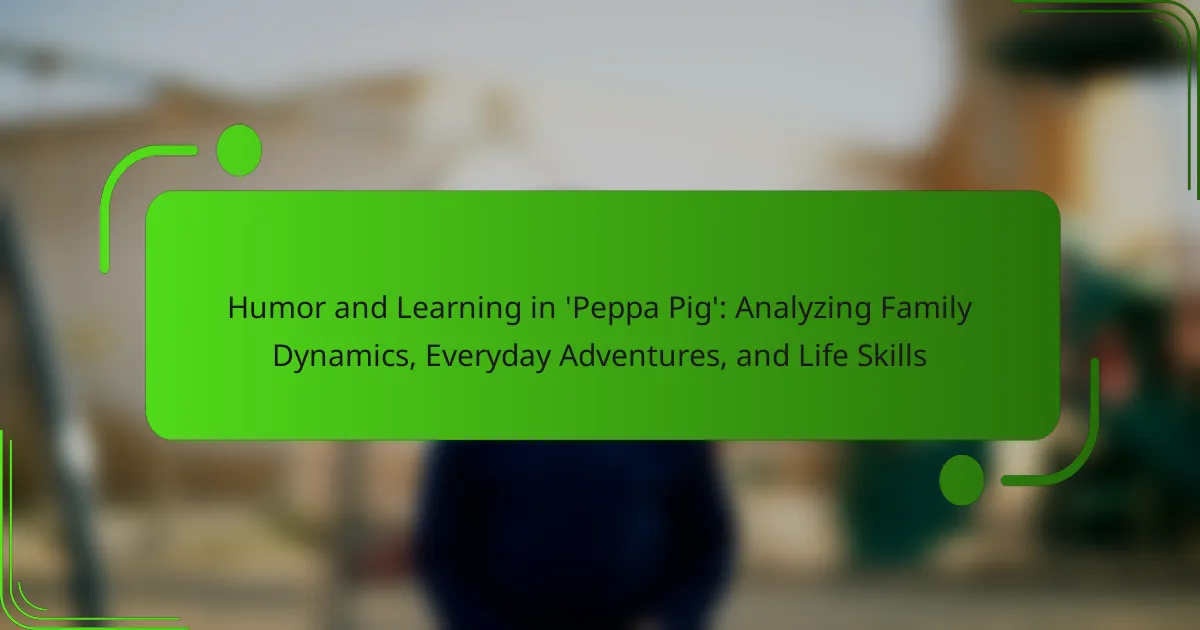The article examines the role of humor in the children’s animated series ‘Peppa Pig’ and its impact on learning. It highlights how relatable family dynamics and everyday scenarios engage young audiences while teaching essential life skills such as sharing, problem-solving, and empathy. The interactions among characters emphasize positive family relationships and effective communication, which contribute to children’s social development. By presenting humor as a tool for both entertainment and education, ‘Peppa Pig’ fosters a nurturing environment that supports personal growth and social learning.

What role does humor play in ‘Peppa Pig’?
Humor plays a significant role in ‘Peppa Pig’ by engaging young audiences and enhancing their learning experience. The show’s humor often arises from relatable family dynamics and everyday situations. Characters frequently find themselves in amusing predicaments that resonate with children. This relatability helps children connect with the characters and their experiences. Humor in ‘Peppa Pig’ also aids in teaching life skills and social lessons. For instance, playful interactions promote problem-solving and cooperation among characters. The light-hearted tone reduces anxiety around learning new concepts. Overall, humor serves as a tool for both entertainment and education in the series.
How does humor facilitate learning in children?
Humor facilitates learning in children by enhancing engagement and retention of information. When children find something funny, they are more likely to pay attention. This increased attention leads to better understanding of concepts. Humor also creates a positive learning environment. A joyful atmosphere reduces anxiety and fosters creativity. Studies show that humor can improve memory recall. For instance, a study published in the journal “Psychological Science” found that humorous content increases retention rates in educational settings. Overall, humor serves as a powerful tool in facilitating effective learning experiences for children.
What types of humor are commonly used in ‘Peppa Pig’?
‘Peppa Pig’ commonly uses slapstick humor, wordplay, and situational comedy. Slapstick humor is evident in physical antics, such as characters falling or making silly faces. Wordplay often includes puns and playful language that appeals to young viewers. Situational comedy arises from everyday scenarios that children can relate to, such as family outings or mishaps. These types of humor engage children and make the show entertaining and educational. The humor is designed to resonate with preschool audiences, enhancing their understanding of social interactions and family dynamics.
How does humor relate to the themes of family and friendship?
Humor strengthens the themes of family and friendship by fostering connection and easing tension. In family dynamics, humor often serves as a tool for bonding. It creates shared experiences that enhance relationships. For instance, playful banter among family members can lead to laughter, promoting closeness.
In friendships, humor acts as a social lubricant. It helps friends navigate conflicts and misunderstandings. Shared jokes can solidify bonds, making relationships more resilient. Research indicates that laughter can improve communication and empathy among individuals.
In summary, humor plays a crucial role in enhancing family ties and friendships by promoting connection, easing conflicts, and creating shared experiences.
Why is ‘Peppa Pig’ significant in children’s media?
‘Peppa Pig’ is significant in children’s media for its educational content and relatable storytelling. The show teaches essential life skills through everyday adventures. It incorporates humor that engages young audiences while delivering lessons. Family dynamics are central to the narrative, promoting values like sharing and friendship. The animation style is simple and colorful, appealing to preschoolers. ‘Peppa Pig’ has received multiple awards for its impact on early childhood education. Research indicates that the show enhances vocabulary and social skills in children. Its global reach demonstrates its effectiveness across diverse cultures.
What educational messages are conveyed through the show?
The show conveys educational messages about family values, friendship, and problem-solving. It emphasizes the importance of family interactions and support. Characters demonstrate sharing, cooperation, and empathy in various situations. The show also teaches basic life skills through everyday adventures. Concepts like respect for others and understanding emotions are explored. Episodes often include lessons on honesty and responsibility. These messages are reinforced through relatable scenarios that children can understand. Overall, ‘Peppa Pig’ uses humor to make learning engaging and accessible for young viewers.
How do characters in ‘Peppa Pig’ model social interactions?
Characters in ‘Peppa Pig’ model social interactions through relatable scenarios and dialogue. They engage in play, share experiences, and resolve conflicts. For example, Peppa and her friends often play together, demonstrating cooperation and teamwork. They also express emotions, such as happiness and frustration, which helps children understand feelings. The characters use polite language and greetings, teaching social etiquette. Conflicts are typically resolved through discussion or compromise, showcasing problem-solving skills. This approach encourages children to mirror these behaviors in real life. Studies show that children learn social skills effectively through observation of such interactions in media.

How are family dynamics portrayed in ‘Peppa Pig’?
Family dynamics in ‘Peppa Pig’ are portrayed through interactions among family members. The show emphasizes love and support within the family unit. Peppa, her brother George, and their parents often engage in playful activities together. These activities highlight cooperation and problem-solving. The characters demonstrate effective communication and emotional expression. For instance, they openly share feelings during various adventures. The portrayal reflects positive family relationships and nurturing environments. This depiction aligns with educational themes aimed at young audiences. Overall, ‘Peppa Pig’ presents family dynamics as foundational to personal growth and social learning.
What family roles are depicted in the show?
The show ‘Peppa Pig’ depicts several family roles including parents, siblings, and grandparents. Peppa and George are siblings, showcasing the dynamics of brother-sister relationships. Their parents, Daddy Pig and Mummy Pig, represent nurturing and authoritative figures. The grandparents, like Granny Pig and Grandpa Pig, provide wisdom and support. Each role contributes to the show’s themes of family bonding and everyday learning experiences. The interactions highlight the importance of family in problem-solving and social skills development.
How do these roles influence children’s understanding of family structures?
Roles in family dynamics significantly shape children’s understanding of family structures. In shows like ‘Peppa Pig’, characters represent various family roles. These roles include parents, siblings, and extended family members. Children observe interactions among these characters. They learn about responsibilities, relationships, and support systems. Research indicates that media influences children’s perceptions of family norms. For instance, a study by the American Psychological Association found that children who engage with family-oriented media develop stronger concepts of familial roles. This exposure helps them recognize diversity in family structures. Ultimately, such representations foster acceptance and understanding of different family dynamics.
What lessons about cooperation and conflict resolution are presented?
The lessons about cooperation and conflict resolution presented in “Peppa Pig” emphasize teamwork and communication. Characters often face disagreements that require them to listen to each other. For example, episodes depict Peppa and her friends resolving conflicts through dialogue. This encourages young viewers to understand different perspectives. The show illustrates the importance of compromise in achieving mutual goals. Additionally, it demonstrates that conflicts can be resolved positively through collaboration. These lessons align with early childhood education principles promoting social skills. Research indicates that children learn effective conflict resolution strategies through role models in media.
How do everyday adventures contribute to learning?
Everyday adventures contribute to learning by providing practical experiences that enhance understanding. Engaging in activities like visiting a park or exploring nature fosters curiosity. These adventures encourage problem-solving and critical thinking skills. Children learn to navigate social interactions during play. They also develop emotional intelligence by managing feelings in various situations. Research shows that experiential learning is effective for cognitive development. For example, a study by Kolb (1984) emphasizes the importance of direct experience in learning processes. Therefore, everyday adventures serve as valuable opportunities for holistic learning.
What types of adventures do the characters experience?
The characters in ‘Peppa Pig’ experience various everyday adventures. These include outdoor activities like jumping in muddy puddles. They also engage in family outings to places such as the zoo and the beach. The characters partake in imaginative play, like pretending to be pirates or astronauts. They face challenges, such as learning to ride a bicycle or overcoming fears. Each adventure promotes life skills and problem-solving. The humor in these situations enhances the learning experience for young viewers.
How do these adventures teach life skills and problem-solving?
Adventures in ‘Peppa Pig’ teach life skills and problem-solving through relatable scenarios. Characters face challenges that require teamwork and communication. For example, building a treehouse involves planning and collaboration. This fosters critical thinking and negotiation skills among young viewers. Each episode presents a problem that needs a solution, promoting resilience. Children learn to adapt when things don’t go as planned. The humor in these situations makes the lessons engaging and memorable. Research shows that children learn effectively through storytelling and relatable content. This method reinforces the importance of life skills in a fun context.

What life skills are emphasized in ‘Peppa Pig’?
‘Peppa Pig’ emphasizes various life skills, including sharing, problem-solving, and empathy. The show teaches children the importance of sharing toys and taking turns. Problem-solving is highlighted through scenarios where Peppa and her friends face challenges. Empathy is demonstrated when characters show understanding towards each other’s feelings. Additionally, the series promotes cooperation through group activities. These skills are essential for social development in early childhood. The engaging stories provide relatable situations for children to learn these skills effectively.
How does the show address emotional intelligence?
The show ‘Peppa Pig’ addresses emotional intelligence through relatable scenarios and character interactions. Characters express a range of emotions, helping children identify feelings. For instance, Peppa and her friends experience joy, sadness, and frustration during their adventures. The show encourages empathy by showcasing characters supporting each other in difficult moments. Dialogue often includes discussions about feelings, promoting emotional vocabulary. This approach aids children in understanding their own emotions and those of others. Research indicates that early exposure to emotional intelligence concepts fosters social skills in young children.
What specific episodes illustrate the development of empathy?
Episodes that illustrate the development of empathy in “Peppa Pig” include “The Long Grass,” “The Playground,” and “Mister Bull in a China Shop.” In “The Long Grass,” Peppa and her friends learn to understand each other’s feelings when they encounter a scary situation. “The Playground” showcases Peppa helping her friend Suzy Sheep when she feels left out, demonstrating supportive behavior. In “Mister Bull in a China Shop,” Peppa and her family show empathy towards Mister Bull when he accidentally causes chaos, highlighting the importance of understanding others’ perspectives. These episodes effectively convey lessons about empathy through relatable scenarios and character interactions.
How do characters demonstrate resilience in challenging situations?
Characters demonstrate resilience in challenging situations by adapting to difficulties and maintaining a positive attitude. In ‘Peppa Pig,’ characters face obstacles, such as losing a toy or dealing with bad weather. They respond by finding creative solutions, like playing indoors or helping each other. This behavior teaches young viewers the importance of perseverance. Studies show that resilience in children’s programming can enhance problem-solving skills. Characters’ experiences illustrate that setbacks are part of life and can be overcome with support and humor.
What practical tips can parents use to enhance learning through ‘Peppa Pig’?
Parents can enhance learning through ‘Peppa Pig’ by engaging in discussions about the episodes. Ask open-ended questions to stimulate critical thinking. Encourage children to relate the stories to their own experiences. Use the show’s themes to teach life skills, such as sharing and problem-solving. Incorporate activities related to the episodes, like drawing or role-playing. Reinforce vocabulary by discussing new words introduced in the show. Set aside time for viewing together to promote bonding and dialogue. Utilize ‘Peppa Pig’ as a springboard for lessons on family dynamics and social interactions.
How can parents engage children in discussions about episodes?
Parents can engage children in discussions about episodes by asking open-ended questions. These questions encourage children to express their thoughts and feelings. For example, parents might ask, “What was your favorite part of the episode?” This prompts children to reflect on the content. Additionally, discussing the characters’ actions can help children understand different perspectives. Parents can say, “Why do you think Peppa felt that way?” This fosters empathy and critical thinking. Sharing personal experiences related to the episode can also deepen the conversation. For instance, a parent might share a similar adventure. This creates a connection between the child’s viewing experience and real life. Engaging in these discussions enhances comprehension and retention of lessons presented in the episodes.
What activities can complement the lessons learned from ‘Peppa Pig’?
Activities that can complement the lessons learned from ‘Peppa Pig’ include role-playing and storytelling. Role-playing allows children to act out scenarios similar to those in the show. This helps them understand family dynamics and social interactions. Storytelling encourages creativity and reinforces the themes of friendship and problem-solving found in ‘Peppa Pig’.
Additionally, arts and crafts can be used to create characters from the show. This engages children in a hands-on activity while reinforcing the lessons learned. Outdoor play can also mirror the adventures of Peppa and her friends. This promotes physical activity and social skills.
These activities align with the educational goals of ‘Peppa Pig’, which include developing life skills and fostering emotional intelligence.
Humor is a central element in ‘Peppa Pig’, engaging young audiences while enhancing their learning experiences through relatable family dynamics and everyday situations. The show employs various types of humor, including slapstick and wordplay, to facilitate learning, promote social skills, and teach life lessons. Key themes include cooperation, empathy, and problem-solving, illustrated through the characters’ adventures and interactions. The article analyzes how humor strengthens family bonds and friendships, contributes to emotional intelligence, and provides practical strategies for parents to enhance learning through the show. Overall, ‘Peppa Pig’ serves as an effective educational tool, blending entertainment with essential life skill development for children.
